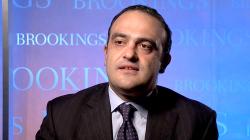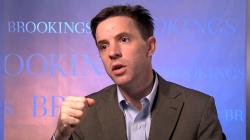Since 2010, developments in the eurozone have invariably been described as a “crisis,” often with the assumption that the currency union would ultimately unravel. What this narrative misses, however, is the other important part of the story—how European leaders, at the same time as they are battling difficult economic conditions, are slowly building more solid foundations for the eurozone to make it a viable currency union.
It is that part of the story that the Brookings Survey on Eurozone Progress, meant to be updated quarterly, is tracking. While it is still possible that an accident will precipitate the collapse of the eurozone, the objective of this survey is to offer the best estimate, by Brookings scholars, of the progress made by European leaders in building a more solid and resilient currency union.
In our eyes, the goal for the eurozone must be to reach a point where the adjustment mechanisms within the monetary union are sufficient to handle periods of extreme stress, such as the current period. The balance can be achieved by minimizing the sources of stress, which usually relate to differences between the national economies, or by maximizing the ability to adjust to the stresses, or a combination.
There are multiple configurations of political, economic, and financial arrangements that would theoretically produce a sustainable system for adjustments to compensate for stresses. In other words, there are many possible roads to eurozone 2.0. Rather than choosing a path, we have drawn a list of six broad objectives where we think progress is needed in the coming years if the eurozone is to become self-sustaining and resilient: 1. creating a political union, 2. creating a fiscal union, 3. creating a banking union, 4. enhancing the role of the ECB in ensuring liquidity and market access, 5. creating sovereign crisis resolution tools, 6. improving competitiveness and economic adjustment.
We then asked 14 Brookings experts—American and European—to give us their best assessment of the degree of progress made by European leaders in reaching these six objectives. Some scholars have given their estimate for all six objectives, while others have focused on a few objectives only, depending on their areas of expertise. The scale runs from 0 to 100%, where 0% represents the least solid and resilient union consistent with the formal existence of such a union and 100% represents the ability to withstand the pressures of a severe, low-probability scenario with no more likelihood of a eurozone breakup than strong national governments face of their own unraveling. For more on the methodology, see the notes and methodology section (PDF). We offer the result as a range of expert opinions, recognizing the complexity of these issues and the subjectivity of the judgments.
In a nutshell: the inaugural survey results bring out three striking conclusions.
- There is a clear consensus that the eurozone is a significant way toward viable long-term structures—the average assessment by scholars puts overall progress at 45%—but there is a long way to go.
- The most progress so far is in central banking (67%) and sovereign debt crisis support (55%), and the least in deeper political union (37%).
- There is fairly wide disparity among individual experts which is not surprising given the complexity and subjectivity of the analysis; assessments of overall progress range from 25% to 75%. Full explanations from the experts of their assessments are available in the “survey responses” section.





